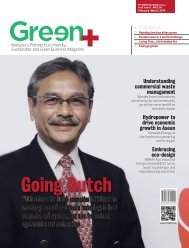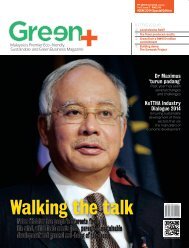Green+ Malaysia's Premier Eco-friendly, Sustainable and Green Business Magazine
SIRIM - Technology Provider
SIRIM - Technology Provider
You also want an ePaper? Increase the reach of your titles
YUMPU automatically turns print PDFs into web optimized ePapers that Google loves.
ENVIRONMENT<br />
amended version of the Plan has been<br />
approved by the Malaysian Cabinet<br />
Ministers in June 2013.<br />
“The amendment to the National<br />
Haze Action Plan is to ensure<br />
actions taken by the key agencies<br />
such the National Security Council,<br />
Ministry of Education, Ministry of<br />
Health, Department of Environment,<br />
Meteorological Department <strong>and</strong> other<br />
relevant government departments are<br />
implemented at early stage according<br />
to the air quality status <strong>and</strong> current<br />
weather condition.<br />
“The amended Plan will enable the<br />
agencies to take more practical <strong>and</strong><br />
proactive measures in dealing with<br />
recurrent deterioration of air quality <strong>and</strong><br />
haze as well as to prevent the air quality<br />
from worsening.<br />
“The action lines will also ensure<br />
the public to get accurate information<br />
on the air quality status <strong>and</strong> thus be<br />
more alert to take preventive measures<br />
in their health care during the haze<br />
particularly to the high risk people<br />
such as the elderly, children, patients<br />
with respiratory problem <strong>and</strong> asthmatic<br />
patients,” said Palanivel.<br />
Under the auspices of the<br />
Agreement, ASEAN over the years has<br />
developed <strong>and</strong> implemented numerous<br />
activities at the national <strong>and</strong> regional<br />
level in the areas of prevention, monitoring<br />
<strong>and</strong> mitigation of haze. Substantive<br />
measures <strong>and</strong> concrete on-the-ground<br />
activities to address l<strong>and</strong> <strong>and</strong> forest fires<br />
in the region include among others:-<br />
1) implementation of the Regional Haze<br />
Action Plan (RHAP);<br />
2) implementation of ASEAN<br />
Agreement on Transboundary Haze<br />
Pollution;<br />
3) implementation of ASEAN Peatl<strong>and</strong><br />
Management Strategy (2006-2020)<br />
to promote sustainable use of peatl<strong>and</strong>s<br />
<strong>and</strong> alternative livelihoods,<br />
while preventing l<strong>and</strong> <strong>and</strong> forest<br />
fires as peatl<strong>and</strong>s are a major source<br />
of smoke haze in the region;<br />
4) adoption of zero-burning /<br />
controlled-burning policy <strong>and</strong> strict<br />
enforcement of the policy;<br />
5) establishment of Panel of<br />
ASEAN Experts on Fire <strong>and</strong> Haze<br />
Assessment <strong>and</strong> Coordination to<br />
undertake rapid assessment for fire<br />
suppression ; <strong>and</strong><br />
6) the establishment of ASEAN<br />
Sub-Regional Ministerial Steering<br />
Committee (MSC) on Transboundary<br />
Haze Pollution in 2006 to oversee the<br />
plan of action, foremost of which<br />
to foster <strong>and</strong> strengthen regional<br />
cooperation to effectively tackle<br />
transboundary haze pollution<br />
resulting from l<strong>and</strong> <strong>and</strong> forest fires.<br />
Palanivel said despite preventive<br />
Hills surrounding FRIM<br />
are shrouded in mist.<br />
measures, Malaysia recognised more<br />
concrete <strong>and</strong> well-coordinated procedures<br />
for immediate fire suppression<br />
need to be outlined <strong>and</strong> adopted<br />
by ASEAN countries. In this regard,<br />
Malaysia hosted the inaugural ASEAN<br />
Task Force Meeting to Review Alert<br />
Levels <strong>and</strong> Trigger Points on Fire<br />
Suppression on June 11-12, 2014 in Kuala<br />
Lumpur.<br />
This ASEAN Task Force comprising<br />
of Panel of Experts on Fire <strong>and</strong> Haze<br />
Assessment <strong>and</strong> Coordination is established<br />
pursuant to the Environment<br />
Ministers’ decision at the 9th Meeting of<br />
the Conference of Parties to the ASEAN<br />
Agreement on Transboundary Haze<br />
Pollution (COP-9) held on Sept 25, 2013<br />
in Surabaya, Indonesia. The ASEAN Task<br />
Force Meeting agreed to recommend to<br />
the upcoming Meeting of Conference<br />
of the Parties to the ASEAN Agreement<br />
on Transboundary Haze Pollution (COP)<br />
in Lao PDR in September 2014 to adopt<br />
the alert levels, trigger points <strong>and</strong><br />
actions on fire suppression to ensure<br />
expeditious response in preventing the<br />
occurrence of transboundary haze.<br />
OZONE LAYER PROTECTION<br />
Malaysia acceded to the Vienna<br />
Convention <strong>and</strong> ratified the Montreal<br />
Protocol on Substances that deplete<br />
the ozone layer on 29 August 1989.<br />
Kuala Muda Bird<br />
Sanctuary.<br />
Being classified as Article 5 country<br />
under the Montreal Protocol, Malaysia<br />
is qualified for financial assistance<br />
from Multilateral Fund to the Montreal<br />
Protocol <strong>and</strong> thus eligible for technical<br />
assistance including transfer of technology<br />
in phasing out ozone depleting<br />
substances to the industries.<br />
Ministry of Natural Resources<br />
<strong>and</strong> Environment, via Department of<br />
Environment, is the focal point for<br />
the Montreal Protocol in coordinating<br />
the implementation of projects <strong>and</strong><br />
activities related to phasing out the<br />
ozone depleting substances (ODS) in<br />
the country. Under Multilateral Fund<br />
financial assistance, ODS phase out<br />
projects are implemented with support<br />
from other international agencies<br />
such as United Nations Environment<br />
Programme (UNEP), United Nations<br />
Development Programme (UNDP),<br />
United Nations Industrial Development<br />
Organisation (UNIDO) <strong>and</strong> World Bank.<br />
Malaysia took early action towards<br />
controlling consumption of ODS with<br />
prohibition on import of chloroflurocarbon<br />
(CFC), halon <strong>and</strong> carbon since<br />
1st January 2010. Prohibition of Methyl<br />
Bromide used for non-Quarantine<br />
Preshipment will prohibited by 2015.<br />
The latest Malaysia’s obligation under<br />
the Montreal Protocol is to phase out<br />
hydrochlorocarbon (HCFC) by 2030<br />
with the development of HCFC Phase<br />
out Management Plan (HPMP).<br />
The objectives of the HPMP’s<br />
strategy are to facilitate Malaysia’s<br />
compliance with control targets<br />
for HCFC Consumption with<br />
minimal impacts on the national<br />
economy <strong>and</strong> environment. The<br />
implementation involves combination<br />
of interventions such as technology<br />
transfer investment, policies <strong>and</strong> regulation,<br />
technical assistance, capacity<br />
building of industries <strong>and</strong> enforcement<br />
officers, management coordination <strong>and</strong><br />
monitoring.<br />
The HPMP is currently being<br />
implemented with the support from<br />
UNDP for HPMP Stage 1 (2012 – 2016) in<br />
order to meet the 2013 freeze <strong>and</strong> 2015<br />
reduction target of 10% of HCFC under<br />
the Montreal Protocol. HPMP Stage 2<br />
(2016-2020) is a way forward to address<br />
further reduction of HCFC in Malaysia<br />
until it reaches its total phase out by<br />
2030. HPMP Stage 2 is still at its preliminary<br />
stage <strong>and</strong> the proposal will be<br />
submitted to the Executive Committee<br />
of Multilateral Fund for approval on the<br />
funding.<br />
PART II: The Minister speaks about<br />
Malaysia’s efforts in sustaining the<br />
forest <strong>and</strong> tackling country’s water<br />
woes<br />
green+.2014, november-december 15





